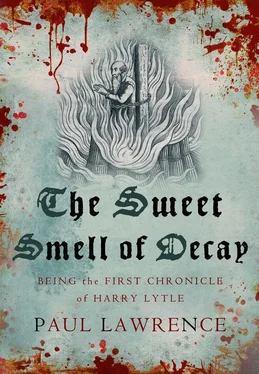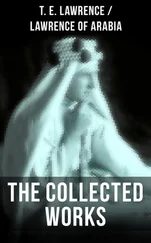Paul Lawrence - The Sweet Smell of Decay
Здесь есть возможность читать онлайн «Paul Lawrence - The Sweet Smell of Decay» весь текст электронной книги совершенно бесплатно (целиком полную версию без сокращений). В некоторых случаях можно слушать аудио, скачать через торрент в формате fb2 и присутствует краткое содержание. Год выпуска: 2014, ISBN: 2014, Издательство: Allison & Busby, Жанр: Исторический детектив, на английском языке. Описание произведения, (предисловие) а так же отзывы посетителей доступны на портале библиотеки ЛибКат.
- Название:The Sweet Smell of Decay
- Автор:
- Издательство:Allison & Busby
- Жанр:
- Год:2014
- ISBN:9780749015473
- Рейтинг книги:5 / 5. Голосов: 1
-
Избранное:Добавить в избранное
- Отзывы:
-
Ваша оценка:
- 100
- 1
- 2
- 3
- 4
- 5
The Sweet Smell of Decay: краткое содержание, описание и аннотация
Предлагаем к чтению аннотацию, описание, краткое содержание или предисловие (зависит от того, что написал сам автор книги «The Sweet Smell of Decay»). Если вы не нашли необходимую информацию о книге — напишите в комментариях, мы постараемся отыскать её.
The Sweet Smell of Decay — читать онлайн бесплатно полную книгу (весь текст) целиком
Ниже представлен текст книги, разбитый по страницам. Система сохранения места последней прочитанной страницы, позволяет с удобством читать онлайн бесплатно книгу «The Sweet Smell of Decay», без необходимости каждый раз заново искать на чём Вы остановились. Поставьте закладку, и сможете в любой момент перейти на страницу, на которой закончили чтение.
Интервал:
Закладка:
Then he turned on his heel and left me, all alone. I had never been more confused in all my life.
Yet at the crux of all of this was this girl that died ten years ago. Jane Keeling — was she pregnant when she died or was she not? Which tale was true?
Chapter Twenty
Two species of this plant are defined by botanists: we think that each of the two species is found with us, but we have not yet distinguished them accurately.
By the time the sun rose weakly to cast its white light on the grey winter countryside, I was almost at Epsom. Hiring a horse to ride myself I was oblivious to the possibilities of tobymen. I had nothing much left to steal. I felt more miserable and frightened than I had ever felt in my whole life, but also determined not to be humbled by the likes of Shrewsbury, Keeling and Hill. Dowling had refused to come with me, though he had, finally, at least ceded that I was sincere in my convictions. I had decided to dig up Jane Keeling’s corpse.
If I discovered that she was with child when she died, then I would accept the story as true. If not — then I would know that the story was false, arranged by Shrewsbury. Dowling’s idea was to press the surgeon John Stow, but that was no remedy. Stow was a weak and miserable fellow and would say whatever needed to be said to save his skin. I had to be certain. Still — it was not a happy prospect that I had committed myself to.
Bleakness enveloped me like a damp blanket until, with just five miles to go, I came round a rolling curve in the road and saw a turnpike, a heavy gate with metal spikes on top of it, just a hundred yards in front. This was new. It had not been here before. There were three horses tied to it. Pulling up my horse I leant forward against its ears, peering into the faint light, listening. Three horses and no riders. No one would leave horses unguarded. Birds scrabbled in the hedgerows, an owl hooted, late back to its nest. Sitting a while I watched and listened. It was meant for me, this new construction. I was certain that men were out looking for me now that we had taken Hewitt. But why would they hunt for me on the road to Epsom? Had Hill betrayed me? Even if I cleared the turnpike, just being spotted would mean at least three men on my tail, each with a fresh horse. How many more were lurking further on? I considered kicking on anyway, in the hope that this was nothing to do with me at all, but I didn’t. That would be a final mistake.
Pulling the horse round I rode back the way I had come, looking for a different road. I felt panicked, for I had counted on arriving before dawn, that I might work in the graveyard undisturbed. I did not want to arrive late, I could not! Half a mile back I found a narrow lane to my left. It was chewed up and rutted but solid underfoot, still frozen by the freezing night airs. Hesitating for just one moment, I kicked at the horse’s flanks with my heels, forcing it into a trot, but before we had got a mile the lane had got narrower, the trees were shorter and the overhanging branches reached lower. Soon I had to bend double over the neck of the horse to avoid being dislodged from the saddle. Then I cursed, screamed out loud in frustration as the lane petered out altogether. Forced to dismount I pulled the damned horse through clinging brambles and prickled bushes. Walking, I followed what I thought was a straight line for half an hour. My guts were churning and my temper was brittle, almost broken. As I watched, the pale sun rose sickly through the web of dead branches that spread their long, spindly fingers above my head. Veering left I prayed that the road lay in that direction, beyond the turnpike. But I was still walking another half-hour later, my soul dead, pushing on forwards, oblivious to the thorns and spikes that tore at my clothes and skin. Then the trees began to thin out, and the brambles gave way to low ferns. Remounting, I rode at a steady pace, but still all I could see was a wall of trees, the silent forest floor laid out before me like an endless twisting carpet of twigs winding a crazy path through the banks of still ferns. I was hopelessly lost.
I smelt the smoke before I saw it. It wafted gently through the woods, hanging in the windless air. Climbing down cautiously I looked for movements, listened for unnatural sounds. All I could hear was the sound of the horse’s hooves and my own feet. I walked to what looked like the source of the smoke and soon emerged into a small clearing. There was a hut. The smoke came from a makeshift chimney. Should I skirt round it? But what then? I had to rediscover the trail to Epsom. The soldiers would not have come this way, surely? I tied the horse and walked forward as quietly as I could, anxious not to scare whoever it was that lived in the ramshackle wooden hut with its pitched roof and crooked walls. The door was crudely hewn of thick wood.
‘Hello there!’ I called, with more confidence than I felt.
‘Hello.’ A pair of curious pebbly eyes emerged from inside and stared out at me from beneath a furrowed brow, above pursed, questioning lips. The man had wild, unkempt, straggly white hair and pouched cheeks. Nose wrinkled and twitching. ‘What do you want?’
‘Can you tell me how to get back onto the road? I’m headed for Epsom.’
‘Oh aye? What you doing here?’
‘I got lost back there in the forest.’ Beyond the small clearing there were woods in all directions. ‘Is this where you live?’
‘Aye. Where I live and where I work. What were you doing riding your horse in the forest? What do you want here? You ain’t from around here.’
No one was from ‘around here’ — there was no one around here. ‘I got lost.’ In the hut I saw four rabbits and a pheasant strung up hanging from the ceiling. A poacher. Scum.
His upper lip curled up, revealing thin yellow pegs growing out of shrivelled grey gums. Contemptuous eyes skinned me. ‘No you din’t get lost. You din’t get lost. You came ridin’ down the road, saw the turnpike, thought you’d try and ride round it. I saw yer. I was there, weren’t I? You was trying to avoid the soldiers. There’s a reward on you, I reckon.’
‘There’s a reward on you too, I reckon,’ I snorted.
Eyeing me up and down, he blinked slowly. Then he grunted and withdrew into his cabin for a moment, returning with a large skinning knife, very sharp and with a wicked serrated edge. His legs were very short — really stumpy. Carrying the knife in the palm of his hand he looked me in the eye. There was neither malice nor anger in his expression, just the same matter-of-fact puzzled sneer. He was going to kill me with that knife.
‘I wasn’t threatening you,’ I said quietly.
Staring at me for what seemed like an age, the little man stood his ground. He was in control, this poacher, not me. ‘Don’t matter if you was,’ he said at last, plunging the knife into his belt then beckoning me to follow him into his hut. I didn’t want to go with him, but wanted to ride around the woods in circles all day even less. There was a small stove in the centre with a pot on it. The little man spooned out two bowls and handed one to me. The broth was thick and grey with bundles of herbs sticking out of it. I took a sip. It tasted of unlawful rabbit.
‘Now then. Who are yer? Dressed nice. Why are the soldiers after yer?’ The poacher sipped at his bowl gracelessly, spilling the thick soup down his shirt.
‘I’m trying to get to Epsom. I have to get there quickly and don’t want to be bothered by soldiers at turnpikes.’ I ate. I was ravenous.
Drinking noisily then smacking his lips, the poacher stared at a point about halfway up the wall in front of him. ‘Well that’s very interr-restin’. Also it’s a load of old cobblers. Wandering off into these woods rather than have a chat with a load of sleepy soldiers. What sort of story is that? Unless you be the one they’s lookin’, for of course. You don’t want to be tellin’ me your business, then that’s fine by me, mister, and I won’t be tellin’ you mine. Part of my business is knowin’ how to get from here to Epsom without using the main road.’
Читать дальшеИнтервал:
Закладка:
Похожие книги на «The Sweet Smell of Decay»
Представляем Вашему вниманию похожие книги на «The Sweet Smell of Decay» списком для выбора. Мы отобрали схожую по названию и смыслу литературу в надежде предоставить читателям больше вариантов отыскать новые, интересные, ещё непрочитанные произведения.
Обсуждение, отзывы о книге «The Sweet Smell of Decay» и просто собственные мнения читателей. Оставьте ваши комментарии, напишите, что Вы думаете о произведении, его смысле или главных героях. Укажите что конкретно понравилось, а что нет, и почему Вы так считаете.












